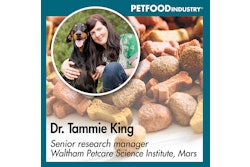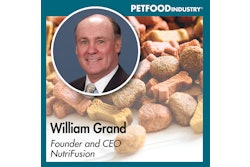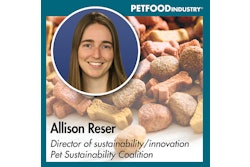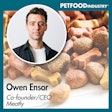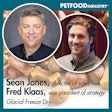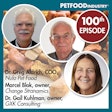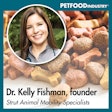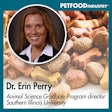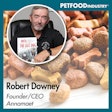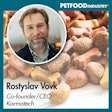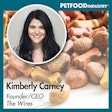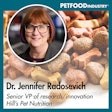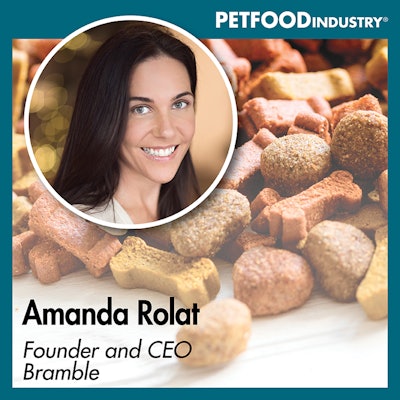
In this episode of Trending: Pet Food, host Lindsay Beaton speaks with Amanda Rolat, founder and CEO of Bramble, about the science behind plant-based pet food diets. Rolat, who transitioned from a legal career to pet food entrepreneurship after losing a dog to cancer, explains how plant-based proteins have long been used in hypoallergenic pet foods and discusses the misconceptions surrounding dogs' dietary needs. She shares insights from Bramble's feeding trial at the University of Illinois, which showed that their plant-based diet was as digestible as traditional chicken-based foods and provided additional health benefits.
The transcript below is from Episode 88 of the Trending: Pet Food podcast, where host Lindsay Beaton and Amanda Rolat, founder and CEO of Bramble, the science behind plant-based pet food diets and where this pet food segment is heading. You can find the episode at Trending: Pet Food Podcast, on SoundCloud or on your favorite podcast platform. This episode originally aired on June 12, 2025.
We want to thank Coperion for sponsoring this podcast. Coperion brings together some of the world's most trusted technology brands to offer innovative system and ingredient automation solutions to pet food producers worldwide.
Lindsay Beaton, editor, Petfood Industry magazine and host, Trending: Pet Food podcast: Hello, and welcome to Trending: Pet Food, the industry podcast where we cover all the latest hot topics and trends in pet food. I’m your host and editor of Petfood Industry magazine Lindsay Beaton, and I’m here today with Amanda Rolat, founder and CEO of Bramble. Hi Amanda, and welcome!
Amanda Rolat, founder and CEO of Bramble: Hi! Thank you for having me.
Beaton: In case you’re unfamiliar with Amanda or Bramble, here’s what you need to know.
When Amanda’s search for high-quality, sustainable, and ethical options for her two rescue dogs left her dissatisfied, she was compelled to hire leading experts to develop something she could trust. This early creation in her kitchen ultimately fueled the development of her own direct-to-consumer brand. Less than three years after launching, Bramble secured the backing and partnership of F-1 Champion Lewis Hamilton and his beloved bulldog, Roscoe. Before starting Bramble, Amanda practiced law in New York City for a decade.
Bramble is the first pet food company that gives dogs a fresh, whole food, plant-based diet developed by board-certified veterinary nutritionists.
Amanda’s dive into veterinary nutrition-backed, plant-based pet food formulations is why I’ve brought her on today to answer this question: What is the science behind plant-based pet food diets?
Now, Amanda, I always like to start these types of conversations with a bit of a trends focus, so we can figure out where this conversation's place in the overall industry. What does the trend of plant-based pet food diets currently look like?
Rolat: It's growing, and "trend" is always a word that I think gives people the wrong impression of "did I do this just because I saw a marketing white space to take advantage of?" Trends are often passing — they're hot, and then they pass on. And this is something that I don't view as just of the moment and something just for now.
The reason is because the numbers vary depending on which experts you speak to, but they can be as high as 30% — though at least 10% of dogs are commonly understood to have allergies, and likely animal protein allergies. In addition to that, over half of dogs are overweight or classified as obese.
What a lot of people don't know is that a lot of hypoallergenic pet foods that are marketed as hypoallergenic have long consisted of plant-based protein. It has long been understood by pet food formulators and by vets and vet nutritionists as an easily digested protein alternative to animal protein that is recommended for dogs suffering from a variety of allergies. That early understanding, for me, that growing understanding among consumers, is really shedding new interest and light onto the benefits of plant protein.
I think that the initial assumption of a lot of people is that this is something that vegans are doing, and that they're forcing their values onto their carnivorous pets—which I'm sure we'll get to whether dogs are actually carnivores or omnivores. But I think that's essentially people's initial reaction when they hear about plant-based pet food, and that's why the word "trend" probably is disconcerting to those people, because they assume that plant-based is having a moment in human pet food, and these plant-based, vegan people are just asserting that onto their unwilling dogs. And that's really not what it is.
I think that this has actually long been understood in the pet food industry, and now there is just a greater understanding surrounding the necessity and the usefulness and the health benefits, because now there are more studies and scientific backing for these kinds of carefully formulated, plant-based diets.
Beaton: Now you came into the pet food space from something that had nothing to do with pet food. What were some of the things that you found, or some of the misconceptions that you personally had that you had to unlearn? And then what were some of the things about these types of diets that you have learned over the years that have strengthened and impacted your journey in the pet food space?
Rolat: The short answer to that is how healthy these diets can be for dogs. The slightly longer answer is that I was a lawyer, as you mentioned. I had my two dogs. I just lost a dog to cancer, and I had these two dogs that were remaining, and I was—am still—in the way that we formulate Bramble, a consumer and a dog mom first. That was how I went about this question of the way that I eat, and my personal beliefs about nourishment and food and large corporations and what is happening to our food system and to us and children as a result.
What I mean by that is the rising numbers of what I consider to be largely food-related diseases, such as a rise in diabetes, a rise in obesity, a rise in heart disease, a rise in cancer. It's very difficult, purely from a science perspective, to isolate diet and prove out these causal connections that directly link diet to these outcomes. But I personally have a belief that a whole food, largely non-processed diet, is key for humans and for our pets as well.
That was really the first "aha" moment that I had—I had been feeding my dog that passed away this largely highly ultra-processed dry food kibble diet. Whether it was an expensive premium kibble or not, these were things that I had long ago rejected in my own diet: don't fall for marketing, read ingredients, no matter how sustainable or well-sourced or whatever the front of the package says, if it's an ultra-processed diet, it should not make up the bulk of your diet.
Similarly, when I had that moment of questioning "well, what do I want to feed my remaining dogs?" and I started to make this shift in my mind, if I wanted to feed them a fresh food diet as much as possible, the second question that came closely behind is, "well, I lean away from a lot of animal protein. I think that less is more in terms of the less you eat, the higher quality it can be, the better sourced it can be." These are benefits all around. They're not just benefits for our own health. They're benefits for the planet, and they're benefits for animal welfare.
That was a strong belief in my own diet, and I started wondering, "well, we feed our dogs a diet that is very highly concentrated in animal protein." I quickly learned this statistic, that the US pet food industry is responsible for up to 30% of the meat that's consumed in this country. That makes complete sense when you learn quickly after that there are more pet dogs and cats than there are children in this country, and that we feed our pet dogs and cats a diet that's very rich in animal proteins.
I just started wondering, first and foremost, as a dog mom, "well, are dogs carnivores? Are they omnivores? Can they eat a plant-based, plant-rich diet?" Knowing nothing about what we had just talked about, that hypoallergenic pet foods are often plant-based, and that a sizable percentage of dogs actually have animal protein allergies—knowing none of this, I just turned to Google and saw that there was some conflict surrounding this topic online. But I really saw some essays and some vets coming out of very prominent, well-known veterinary schools, saying that a carefully balanced plant-based diet is okay to feed to dogs because they are biologically omnivorous.
I think that being a lawyer helped me in this area, because I was skeptical of what I was finding online, and I couldn't find a clear answer. I really wanted to hire experts, and I kind of went about it almost the way that I went about building a case where I hired these experts. I hired board-certified veterinary nutritionists that are available to privately formulate diets for some pet parents, and I basically said to them, "My dogs are my kids. They're my only kids, and I don't want to do something that's going to hurt them or harm them or impede their quality of life or anything." Kind of what I would say to an expert that I'm considering putting on the stand is, "don't tell me what you think I want to hear, really. Just tell it to me straight."
And they did, and I'm very surprised that the pushback you get about feeding plant-based pets tends to be from non-expert people on Instagram — that's where the conflict exists. It doesn't exist in the commercial pet food industry, and it doesn't exist among board-certified veterinary nutritionists, who know that dogs are omnivores and that they are not their wolf ancestors, that they have evolved over tens of thousands of years, and that this is one key genetic difference between dogs and their wolf ancestors. Their teeth have nothing to do with digestion, and the concerns that any vets in the vet community have around plant-based diets are that a lot of people are just kind of cooking for their dogs at home and not following a careful formulation—and that's the key: a careful formulation that provides all of the amino acids and nutrients that dogs really need. Are you supplementing properly?
But a carefully formulated, commercial, plant-based pet food diet can not only be okay for dogs, but I have really come to learn that dogs can thrive on these diets for exactly the reasons that a lot of hypoallergenic pet foods are made of plant protein. It is easily digestible. It is often more consistent than the byproducts that are used in the pet food industry. Anyone who is familiar with formulating and manufacturing pet food knows that these animal byproducts have very inconsistent levels of protein because there are various kinds of inputs. It can be a consistent source of protein. It can be a clean source of protein. It is an easily digested source of protein, and especially the format that I chose for my dogs and for Bramble, which is fresh—it's not ultra-processed. There's no intensive heat processing that denatures the ingredients. It really manages to maintain those protein levels among other nutritional levels of the nutrients in the food.
That's been the biggest surprise as a dog mom, as a consumer. I understand the public's perception because I was on that side of it. I was completely on that side of it, asking all these early questions, and knowing that I had learned, "oh, this is dangerous." If I had had nutritionists say, "I don't feel comfortable formulating something like that” -- that's never happened. It just gave me permission to keep going, keep asking more questions, to turn this into something to provide for other people.
Beaton: There are more and more protein options that are falling under the plant-based umbrella these days, because people are doing more research and focusing on science-backed formulations. There is a call in the consumer space for plant-based proteins, which, obviously you know or you wouldn't have a successful company that is plant-based fresh pet food.
What types of protein options fall under that umbrella, and what has been the most popular as you're working with nutritionists? What ones are they most comfortable using? Finally, what are consumers calling for? Or do they care more about the formulation at large than the actual protein source?
Rolat: That's a good question. Every plant-based company, I think, comes at this with something very different. I can speak as kind of a consumer and dog mom about what I'm seeing some of the other companies doing, and then I can speak about what we chose to do at Bramble.
There are trends in the pet food industry, whether well-founded or not, and one of them is that consumers want to stay away from wheat. They want to stay away from soy. They want to stay away from things that have been largely considered filler ingredients. This often surrounds this confusion, and what I think consumers mistakenly conflate with fresh food diets is that filler ingredients are really used in ultra-processed dry kibble diets, and that there's not necessarily something wrong with, for example, grain. People are moving away from grain and grain-free, and there's really nothing wrong with whole grains. It's actually a very good ingredient for dogs.
That trend led to other concerns about whether grain-free diets are causing dilated cardiomyopathy, which is heart disease in dogs. Again, there was kind of a knee-jerk reaction to, "Well, those grain-free diets are using peas and pea protein and legumes." Then there's a knee-jerk reaction to being anti-legumes, which implicates plant-based diets.
Again, those concerns, for example, are there any causal connection between legumes and peas and dilated cardiomyopathy, have only ever been seen in dry food diets, not across the board, meaning, not across all companies and all formulas and all grain-free lines. There is a theory that if there is any causal connection, which has not been proven, it's really just a sounding alarm that now vets are overly cautious about — it's likely certain grain-free lines in a handful of dry kibble companies that replaced their grain ingredients with these grain-free ingredients, like pea protein and potato protein that had higher protein content. They may have altered other parts of their formula, namely the animal protein parts of their formula, because now they had protein inputs from these grain-free ingredients, and then they denature the ingredients subjected to ultra-processing. Possibly, they are not formulating and supplementing enough taurine and carnitine around these grain-free formulations.
Again, you have these various concerns among consumers. Some don't want soy. Some don't want peas. Those, to me, are trends and marketing words to use on the front of the package. Now you're seeing "pea-free" and "grain-free" and "soy-free." I think that you are never going to find consistency among what consumers really want and what is motivating them more than anything. Is it grain-free? Is it soy-free?
What we did at Bramble is, again, it's a fresh food diet, so we wanted it to have that savory, meaty taste and texture that would really excite dogs at mealtime and not take away what is one of the most special moments during the daytime of feeding your dogs and seeing how excited they get. We needed a plant-based protein, which means anything that is non-animal derived. Our options were going to be mainly either soy or pea protein. We were looking for a textured protein -- kind of like what Beyond and Impossible do — something that has the texturization of a meat-like feel and mouth feel to it. Really, the main two that you could use are soy or pea.
I wasn't anti-soy or anti-pea, for the reasons that we've been discussing, because I knew from that nutritionist that both are very good sources of protein, and that's what matters. Neither are directly linked to any of the concerns that we've been saying — there is not actually in the fresh food arena and in a diet that does not denature the ingredients, then does what Bramble does, which is test at an independent third party and make sure that our protein levels and our amino acid profile is what we are intending it to be for dogs. These concerns are rather baseless.
We just tried a variety of plant-based proteins that were not too high in fiber. A lot of them were too high in fiber, and it then became a weight loss diet for dogs. We needed the right levels of protein, fiber and then palatability. It really had to take on a taste and a texture that dogs were responding to. Of course, I tested everything on my two chief tasters, and we landed on a pea protein. That is our main protein source in Bramble.
Then to of our recipes, we add legumes. One of them has lentils, one of them has garbanzo beans. This variety of proteins really adds to the amino acid profile that is good in Bramble. A lot of vets who look at our amino acid profile are quite surprised, because plant-based diets don't usually have such a good amino acid profile. We really led everything we do at Bramble with not, "Oh, we want to avoid grain, or we want to avoid soy.” We're just really trying to land on the best formula nutritionally on paper, and the best formula palatability-wise, for dogs.
Beaton: There's always more research going on in the plant-based pet food space. What do you think is the most interesting research? What are you keeping an eye on in terms of the evolution of plant-based ingredients in pet food?
Rolat: I know that this is going to sound very biased, and I don't know how to get around that, but Bramble really did what is regarded as one of the most, if not the most interesting, study to date on plant-based canine diets. The reason I say that is because prior to Bramble's feeding trial, there were more and more studies that were coming out -- largely Andrew Knight, out of the UK, had been doing these studies that demonstrated that dogs fed vegan diets could outlive and live longer and have fewer trips to the vet. These are great studies that confirmed what had long been known anecdotally, which is that vegan dogs can live long lives and that the longest living dog was named Bramble and once held the Guinness World Record. She ate a fresh vegan diet throughout her life.
Those studies were becoming more and more in recent years — they were self-reported studies. A lot of the vegan studies prior to Bramble's had used volunteer dogs, volunteer people, and they were self-reporting what was being self-reported to vets, and that was the bulk of the information. These are peer-reviewed studies, so they are legitimate studies, they were not independent studies that used dogs independent of their owners in a controlled setting.
I really believed that we had an uphill battle of assuring pet parents and consumers of the legitimacy and the health of these diets. People, even with dogs who have allergies, want to make sure that they are feeding their dog something that is not only safe, but truly healthy for them — not subpar, but something that can really compete with other options on the market. I thought it was very important, early on, to invest in a feeding trial, an independent feeding trial.
I was led through several sources to Dr. Kelly Swanson at the University of Illinois. They are a very, very well-regarded animal health lab, and well-regarded in several ways. Dr. Swanson is extraordinarily well-known and well-regarded in the pet food industry. He had conducted a lot of research and written a lot of the published papers surrounding whether there is this causal connection between legumes and dilated cardiomyopathy. That's just one small area of research for him — he is very well regarded.
The other is that his animal health lab is not at all considered cruel in any way. They are purely animal health. They don't conduct cosmetic studies. They're not one of these large facilities that mistreat all these beagles. They have a small number of graduate students, and the dogs have their own personal private runs, and the students often adopt the dogs when they graduate out of the program. Those were really the two reasons why I chose Dr. Swanson and the University of Illinois.
They conducted this study where dogs were transitioned to Bramble and fed Bramble against a leading chicken diet that is considered a very well-regarded chicken diet on the market. The results were even surprising, I think, to Dr. Swanson and his team. They were very excited by the results. The first was that they were surprised by the amino acid profile of Bramble. Plant-based diets don't usually have such a good amino acid profile. Then they learned that Bramble's protein was 84% digestible, so that was just as high as the chicken diet that it was compared to. Bramble's fat was over 90% digestible, so that outperformed the chicken diet, showing that Bramble was even more digestible.
Just to break down what that means for listeners: Sometimes, oftentimes, people assume that animal protein is just better protein. You hear that plant protein is inferior to animal protein. What people mean by that, whether they know it or not, is they're talking about the bioavailability of the protein. How much is your body gaining from that protein?
Plants have protein and animals have protein, but that one has more bioavailable protein that's more digestible. We showed that with respect to Bramble's protein, that's just not true — Bramble's protein, Bramble's diet overall, is not only just as good, but it outperformed the chicken diet that it was compared to.
Then we showed that dogs fed Bramble had improved microbiomes and lower cholesterol and triglycerides, and that is really important, especially when you consider that over half of the dogs in the U.S. are overweight or obese, because having a diet that results in lower cholesterol and lower triglycerides can really mean that it is a great diet for weight management and even weight loss. It would be great for dogs with diabetes.
These are important, statistically significant outcomes. The report was peer-reviewed and published in the Journal of Animal Science, and it prompted the British Veterinary Association to re-look and rethink its position against plant-based diets. They came out with an opinion that carefully formulated plant-based diets are an acceptable alternative for pets. It really was the first study of its kind, because it used a controlled setting, and the outcome was significant, and should make pet parents and consumers feel not just okay, but very good in choosing Bramble, whether it's fed completely or in conjunction with something else.
Beaton: A lot of companies in the premium and super premium spaces, where it's known that pet owners are much more involved in their pets' nutrition, and they are willing to go that extra step and do that extra research. How important have you found that it has been to Bramble's customers to be able to take them to that research and say, "Look for yourself. Here's the study. It was independently conducted, it was peer-reviewed." Is that something that you would recommend to others in the space to be able to have that kind of research to go to consumers? Is it something that they're really looking for?
Rolat: I think that a Bramble consumer is looking for that. The pet food industry really does mirror the human food industry. There is never going to be one size that fits all. There is never going to be agreement on the way that we should feed ourselves and therefore our pets. And that's okay, because these are extraordinarily large industries, and you can give everyone what they're looking for.
There are going to be always people in their own diets and in their pets' diets — and I was doing this as well — who feel comforted by marketing terms, and don't read the ingredients on the back of the package, and don't then dig into what those ingredients are. There are always going to be people who have just certain categories of ingredients they stay away from — gluten-free, whether it's processed or not. There's always going to be that reflection in the pet food industry, too.
I think that it's important for certain kinds of companies. If that's your consumer, what I see a lot of — and what I saw as a consumer — is even more so in the pet food industry. It's like people are waking up to "ultra-processed" as a buzzword right now in the human food industry, and people are maybe going to wake up to it in the pet food industry to a greater extent.
You already have these fresh food companies, which are still early and very successful, but it's still a niche part of the pet food industry. Companies don't have to invest in research and don't have to convince their consumers of anything if their consumer is comforted by what's shown on the front of the package. If anyone buying kibble really believes that the ingredients in that kibble look like A Thanksgiving spread on the front of the package, I don't know what more you do or don't have to provide to that consumer.
For our consumers, it's important, especially because several of our consumers — well, we have a few different kinds of consumers. First, there's the consumer that is plant-based and vegan. Like myself, I had not been feeding a plant-based vegan diet to my dogs. Even though there were some vegan kibbles that were available on the market, I didn't know about those. Then when I was making this transition, I personally would have sooner fed a fresh animal-based diet versus a kibble diet to my dogs, and I needed to be convinced as a consumer that was considering feeding plant-based to my dogs who did not have allergies, that this was healthy for them and that I wasn't going to harm them in any way.
Then we have the consumers whose dogs have allergies, and that is just a heartbreaking consumer, because they have tried so many different things, and either nothing is working, or they'll land on something that works, that their dog doesn't like and won't eat. They really have been through it trying to find something that can make their dogs happy again and feel comfortable again. Those consumers also need to be assured that they're still on the right path and that they're not hurting their dogs. Their dogs have been hurting a lot, and they just don't want to hurt them anymore. I think it's important for our consumer.
Finally, what I also see a lot of in the pet food industry is borrowing from other studies, which is misleading. Bramble's study did not say that all plant-based diets are carefully formulated and that all plant-based diets are suitable for dogs. You must be able to trust the company. I have concerns, and I don't want to speak poorly of another company, but I, as a pet parent, would have my own personal concerns about various diets out on the market.
I think each individual company, and you can look at any format, the animal-based, fresh food companies are not all the same. You want to investigate each specific company. I think especially about the newer companies and see to what extent the company cares to do something like a feeding trial and to publish the results and share the results. It's specific to each company.
For us and our kind of consumer, it's important and to other companies, depending on who your consumer is, you must know your customer. If your consumer doesn't care, and you don't care, and it's a very big investment, then that's a choice that people running their own companies can make. It was very important for us, though, and it has helped us enormously.
Beaton: One of the big conversations right now is how to really connect with whoever your consumer is, where to find the people who you are trying to get this pet food to who want this kind of pet food. Where are you finding that your customers hang out? And how do you communicate with them?
Rolat: There was a mentor of mine who I reached out to when I was trying to think about whether I should leave my career and start Bramble. I reached out to a founder and CEO named Andy Levitt, who was the founder and CEO of Purple Carrot, which is the vegan Blue Apron, because it's meal delivery and it's the vegan one in the space. He's such a lovely guy and wrote back to my email right away and has mentored me since and through this journey.
He told me very early on this idea that "people like me do things like me," and this idea -- that if I thought it was important and it had changed what I was doing for my dogs, that there were other people who would be interested in this. The initial place that I found those people, because this was so organic to my interests and where I existed in the world and on social media, that it was — I'm not going to say relatively easy, but our early adopters were people that I had been following and had gotten to know. I'm very involved in animal rescue in New York City. You tend to find that animal rescuers are animal lovers, and they share a lot of this plant-based — whether it's vegan or just plant-rich. There were a lot of shared interests in the community that I had been in for several years, and those were, and continue to be, our early adopters.
It's not just plant-based people. There are people who — we know this all-over social media — are really leaning into whole food, non-processed diets and again, one of our longest customers is not vegan and certainly had no reason to think about feeding her dog that way, except that she has a really picky dog.
Her dog does well on Bramble. It feels good to feed Bramble if it's working for you, because it is sustainable and it is better for the planet and animals. We have people like that. For anyone looking to start some kind of business, the advice Andy gave me, and would have heard it from other people, is, know your customer, don't assume that you are your customer.
In my case, I was very similar to our early adopters, but not entirely. I mean, there are things that didn't matter to me as much as they matter to some of our other customers. You must really listen to your customer. A company cannot be everything for everyone. You also need to figure out what is important to your customers and what's important to you as a company. You cannot check off every box on the list, and just knowing your customers will help you know where to find them and will help you know who to collaborate with and how to reach your customers in that way.
Beaton: As we wrap things up with so much going on in the space, and it's still very much, like you said, a niche and growing space, fresh pet food, plant proteins. There are all kinds of stuff going on right now and all kinds of conversations being had. What do you think is the future of plant-based proteins in pet food?
Rolat: I think it's going to grow in a way that outperforms the trajectory that it's had in human food. And there's a reason for that, which is that there's a lot of conversation around what is happening to plant-based in the human food industry, and "was it just a fad? Was it just a trend?" It was so successful so quickly, that I think that there were some powerful marketing tactics taken against them by the meat industry and convincing everyone that you need so much protein, and if you need to eat your weight in protein, then, yeah, you probably are going to need to eat a lot of animal protein in order to do that. I don't think that that's an accidental trend that's coming out against the success of plant based.
But some legitimate issues surrounding the up and down trajectory that plant-based in the human food industry has had is that, was it filling a need beyond sustainability and animal welfare and health, better choices for people that people really lead when they're making their buying decisions?
Purchasing decisions are dictated first and foremost, by taste and enjoyability and health. If you cannot provide as good, if not better, taste experience, and as good if not better health experience, then you're going to struggle. The way that plant-based milk alternatives has been hugely successful, because they really succeeded on both of those fronts. Some of the other categories really haven't. Therefore, there was a lot of curiosity. There was corresponding disappointment among a lot of non-vegans with what the products were, and they moved on.
I think that with respect to plant-based options in pet food, the significant difference is that there's really a need for it, separate and apart from the people who are drawn to feeding this way because it aligns with their values, which is not an insignificant number of pet owners. You can have a niche category that is an extremely large and successful and meaningful category, but separate and apart from that, there is a need for non-animal-based proteins, because there is at least 10% of dogs who are suffering from protein allergies.
I was just having this conversation with someone about cultivated meat coming to pet food, and whether it's how we raise animals — whether those dogs with animal protein allergies would still have an allergy to cultivated meat, and they think so. There is no real understanding, or maybe even consensus among the vet community, around why a significant number of dogs have these allergies. They just know that they do.
There is a real need for these alternative plant-based proteins, and we know that again, because hypoallergenic pet foods have long relied on plant protein in the pet food industry. I think that growing awareness and then making it — like Bramble did — as tasty, as exciting, as good for dogs is only going to make it grow in a way that we are giving the two things that you really need in order to have it be a growing and staying powerful category, rather than something that comes and passes. In addition to those — by being healthier, by being just as tasty—then it's also more sustainable, and it's also kinder to animals. People care about those if they can get the first two.
Beaton: Well, thank you very much for coming on today and having this conversation with me. The pet food industry has so much going on, and there are so many different segments, and plant-based does not appear to be going anywhere. Like you said, it is growing, and it does have a future in the space. Really talking about some of the nuances behind that space and the business decisions, as well as the consumer side of things is incredibly helpful, I think, in terms of keeping track of what's going on in this segment of the industry. I appreciate you coming on and having that conversation with me.
Rolat: Thank you. I appreciate you having me on and giving me the forum to talk about what has quickly become one of my favorite things to talk about, which is plant-based pet food. Who would have known not too long ago?
Beaton: Before we go, I always like to do a little plug for my guests. Where can people find more information about you and Bramble?
Rolat: Sure. If people would like to purchase or try Bramble, our fresh food is available online at bramblepets.com. We also have treats that are phenomenal, and we sell our treats online at bramblepets.com as well as on Amazon. If people would just like to learn more, follow Bramble, know more about me and just enjoy cute dog content, then they can find us on Instagram and LinkedIn at Bramble Pets.
Beaton: Perfect. That’s it for this episode of Trending: Pet Food. You can find us on PetfoodIndustry.com, or your favorite podcast platform. You can also follow us on Instagram, @trendingpetfoodpodcast. And if you want to chat or have any feedback, I'd love to hear from you. Feel free to drop me an email: [email protected].
Of course, thanks again to our sponsor, Coperion. Coperion brings together some of the world's most trusted technology brands to offer innovative system and ingredient automation solutions to pet food producers worldwide.
Once again, I'm Lindsay Beaton, your host and editor of Petfood Industry magazine, and we'll talk to you next time. Thanks for tuning in!


